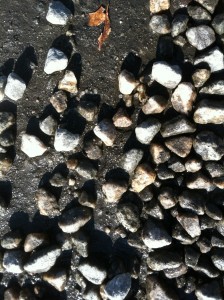Fifth Sunday in Lent | Bones
Ezekiel 37:1-14 and John 11:1-45
 The lectionary guides us to Ezekiel 37:1-14, the valley of the dry bones, and to John 11:1-45, the raising of Lazarus. We are invited, in this time of Lent, this journey toward Jerusalem and the cross, to contemplate the tomb.
The lectionary guides us to Ezekiel 37:1-14, the valley of the dry bones, and to John 11:1-45, the raising of Lazarus. We are invited, in this time of Lent, this journey toward Jerusalem and the cross, to contemplate the tomb.
Ezekiel, the prophet of the exile, visionary, one of the most strange of all the strange people in scripture, tells us of his vision of the valley of dry bones. Ezekiel speaks of many wonderful and frightful things. He sees angelic beings with wings and wheels, cities built like cubes. He sees a valley full of the bones of the dead. The bones are the people of Israel as individuals, all those who perished in the past, being raised at the last day. The bones are also the collective people of Israel, the kingdoms of Israel and of Judah destroyed by oppressors, finally being restored by God. The bones are many things, on many levels.
The bones are us. The bones are our lives, scattered like sand over our days, our losses, our failures, our shortcomings, our longings, our sins. The bones are our ignorance, our hard-headedness, our hard-heartedness. The bones are us.
And here in Ezekiel, ‘son of man’ (your translation may say something else, mortal perhaps) is not a phrase referring to the Messiah. No, in Daniel and in the Gospels we find the messianic phrase ‘the son of Man’ used to describe the one born of woman but who is God. Here, in Ezekiel’s stark vision, the son of man is just that—the dying child of dying children, one who knows and must accept mortality, the unrelenting bondage of time.
Son of man, mortal creature, says our God, can these bones live? Can our shortcomings be repaired, our failures remade? Can our lies be untold, our unkind truths be recalled? Can we find the honesty to see ourselves from within, our sinews, our bones? Can we be saved from the dust of which we came?
Lazarus had been dead for four days.
Again, there are many levels to this Gospel story, many levels to everything John records in this Gospel. We see Jesus, God among us, the resurrection and the life. Who lives and believes in me shall never die, Jesus says, do you believe this? Shall these bones live, oh mortal? O Lord, God, you know the answer, says Ezekiel, and so say we. Yes, Lord, you are the Messiah, says Martha, and so say we.
Just as the bones are us, our lives, our past, our future, so are Mary, Martha and Lazarus. Each of us is them. Each of us is Martha who boldly goes to meet Jesus, to meet God, on the dusty road. Each of us is Mary, holding back, hearing of God’s nearness, God’s approach, but slower to respond, each for our own reasons and for our own time. Each of us is Lazarus, already dead within, carrying the darkness of our own choices, surrounded by the darkness of the world, grieving for ourselves, for those lost before us, grieving for the pain we cannot spare those we love, perhaps for the pain we have caused them, the pain we have caused for ourselves.
We are in Lazarus’ tomb. We are the people sitting in darkness, the prisoners, the poor, the pitiable, the naked and the blind.
And that is the Gospel we hear—that voice. It is Ezekiel, prophesying, O dry bones, hear the word of the Lord. It is Jesus crying, Lazarus, come out! The promise of the Gospel is resurrection, newness, life, the promise of Easter.
For now we wait. These days of Lent give us time, here in the darkness, to gather the bones of our failures, our shortcomings, our doubts and our fears, our losses, our grief, our anxieties, our needs, our weakness. We have time to examine the dry, bare truth of who we are, each of us in the darkness, unknown to those other souls around us. And we wait.
Who believes in me, though they die, yet shall they live.
We wait for the sound of the stone being rolled away, death and loss being remade. We wait for the Easter voice of God, calling us out from our tombs.
Already and not yet—the Gospel promise, the new life in Christ, is described as already and not yet. Already we have the life of God. Not yet are we fully transformed. Lazarus comes out of the tomb, alive, renewed. He is already resurrected, but he is no heavenly being; he is restored, but not yet of a new heaven and a new earth. He walked in the same dusty paths as before, but he no longer carried the dread of death; his second journey to dying became one of hope, a journey toward a voice he knew.
We walk as Lazarus, leaving the darkness behind. Jesus commanded that the robes of death be removed, that Lazarus be unbound. Likewise, hearing that voice, we are raised in renewed life, unbound by those burdens that dragged us into darkness. We leave our bindings behind; there is no need of carrying those burdens any longer.
Easter is the promise of resurrection, the call into new life.
And now we listen. And now we wait.

